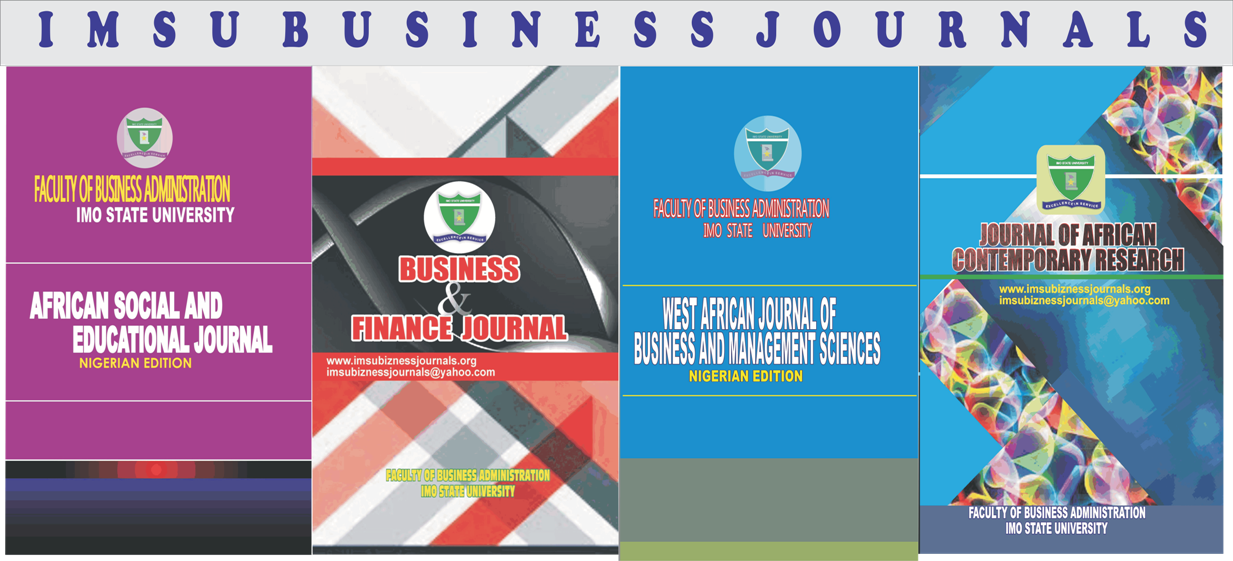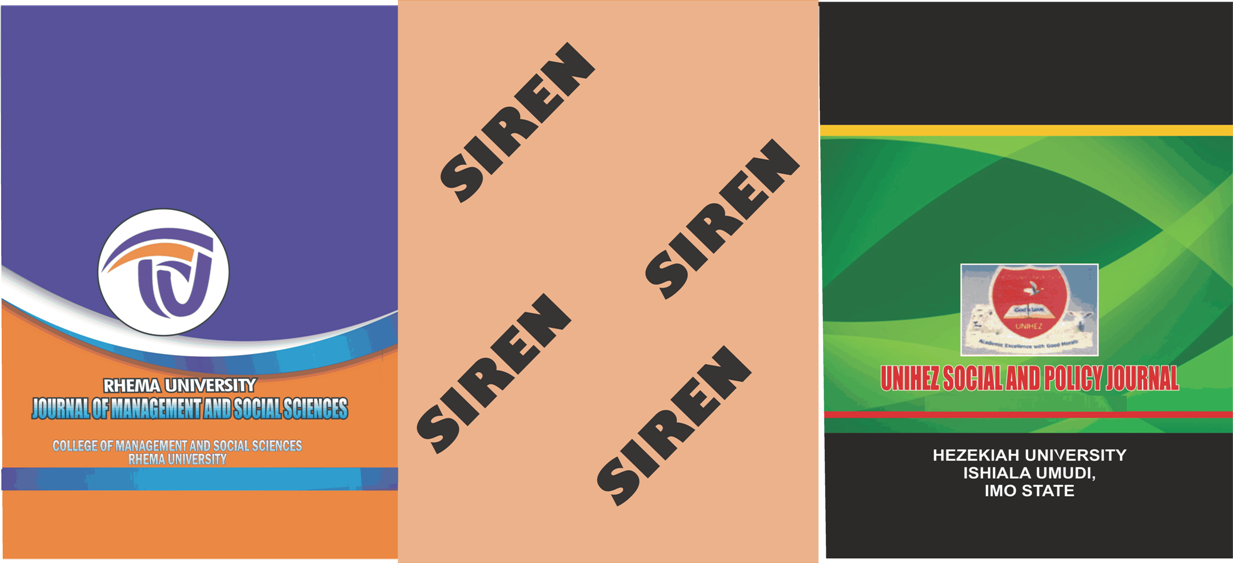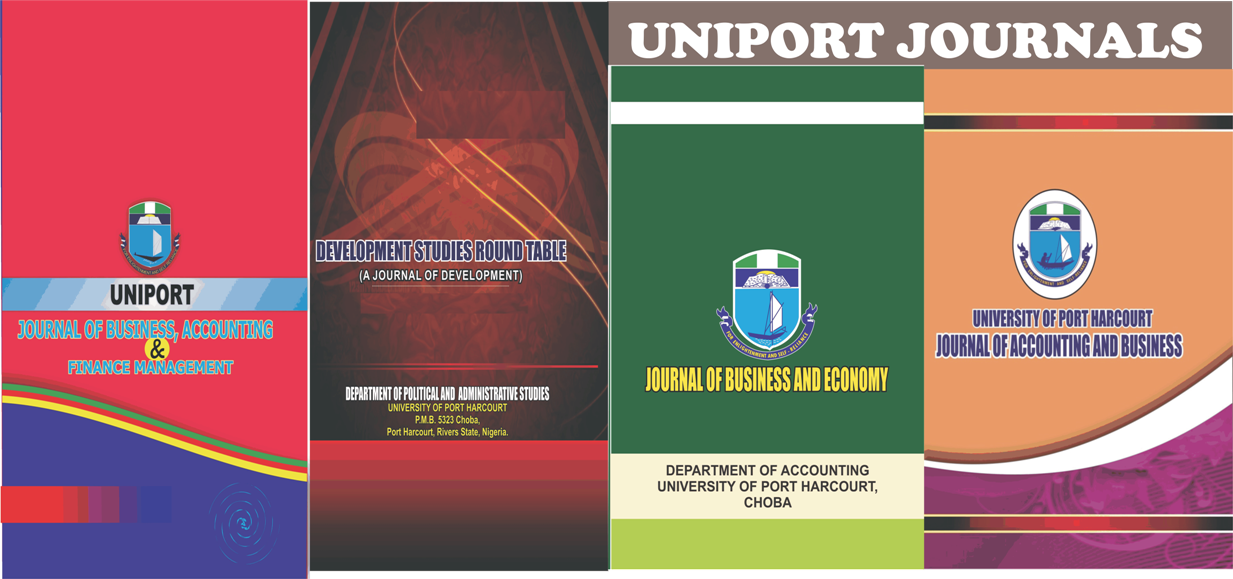2020 Archive
| 1 |
Title: TAXATION AND FINANICAL PERFORMANCE OF SMALL AND MEDIUM ENTERPRISE (SME) IN PORT HARCOURT.pdf Author: OGBONNA G.N. (PhD) ONUOHA T.E. (PhD) SUNDAY CHUKWU AND OJEABURU FRIDAY Abstract: Abstract The study examined the relationship between taxation and financial performance of quoted SMEs in Nigeria from 2013 to 2017. Company income tax and education tax were taxation proxies while return on investment, return on assets and current ratio were the proxies of financial performance. The researchers adopted expost- facto research design for the study. The study used secondary data obtained from the audited annual reports and accounts of the ten listed SMEs’ website and whose stocks are traded on the alternative security market (ASM) in the Nigeria stock exchange. The research data was analyzed using basic descriptive, Pearson product moment correlation and multiple regression in a panel data setting with the aid of E-View version 9. The results revealed that company income tax and education tax have no significant relationship with return on investment return on assets and current ratio quoted small and medium enterprises in Nigeria in the period of this study. We thus concluded that taxation has no significant relationship with financial performance of SMEs in Nigeria in the period of this study. It is recommended that government should review downward the current corporate tax rate of 30% on SMEs to enable them perform optimally in this highly business competitive environment in Nigeria. We equally endorsed that Nigerian tax authority should carry out their duties more efficiently with the most care and integrity to combat multiple taxes for better performance. Keywords: Taxation, financial performance, Nigeria, Small Business, Medium Business View |
| 2 |
Title: ACCESS – DIAMOND BANK DONE – DEAL IN NIGERIA POLICY AND STRATEGIC FINANCIAL MANAGEMENT FOCAL INSTITUTIONAL INSTINCTS.pdf Author: PRINCE UMOR C. AGUNDU PhD. AND SHINTIMA D. ANTO Abstract: Abstract In the annals of Nigerian financial institutions, Access Bank and Diamond Bank once prevailed as two distinct banking constituents. They, later in their institutional life, came together as one, adopting Access Bank as amalgam identity. This marks the done-deal context of the study. The study examines their pre-amalgam features with emphasis on policy and strategic financial management focal institutional instincts. Herein, institutional wealth profile serves dependent variable while Return on Assets (ROA) serves as proxy for profitability. Secondary data are sourced from Central Bank of Nigeria Statistical Bulletin, spanning 2008-2018, and analyzed using descriptive/inferential statistics, with the aid of Statistical Package for Social Sciences (SPSS), at the 0.05 significance level. The analytical outcomes indicate that pre-amalgam institutional wealth profiles of the banks are not significantly different. The study, therefore, concludes that there is no significant difference between pre-amalgam features of the banks. The amalgamation was, thus, inspired by other policy and strategic financial management instincts, particularly associated with corporate restructuring, sustainable robustness, and innovativeness/competitiveness. Executive drivers of the project should keenly accentuate the ideals of corporate governance and efficient service delivery towards strategically consummating anticipated pleasantries with utmost professional precision. Keywords: Corporate amalgamation, Nigerian Banks, Policy and strategic instincts. View |
| 3 |
Title: FINANCIAL INSTITUTIONS DEVELOPMENT AND PER CAPITA INCOME IN SUB-SAHARAN AFRICA A DYNAMIC PANEL GMM APPROACH.pdf Author: ANUYA, DAVID E AND OKEREKE, EMEKA J PhD. Abstract: Abstract This study investigates the effect of financial institutions development on per capita income in Sub-Saharan Africa using the dynamic panel GMM approach. Financial institutions development is measured by three dimensions of financial institution development: access, depth and efficiency, while per capita income is measured in real terms. The data used were collected at yearly interval and have a panel structure, comprising all 48 countries in the Sub-Saharan African region over the period from 2000 to 2017. The empirical analysis is based on the Arellano-Bond first difference approach using lagged levels of the endogenous variables to control the endogeneity problem associated with dynamic panel models. The results from the empirical analysis show that all the dimensions of financial institution development are positively related to per capital income, with both their individual and collective impacts being highly statistically significant. The results also show that per capita income in Sub-Saharan African countries is persistent being significantly determined by its one-period lagged value. Thus, improving financial institutions in terms of access, depth and efficiency would lead to higher per capita income, a prerequisite for economic development in Sub-Saharan Africa. Keywords: Financial institutions development, per capita income, dynamic panel GMM View |
| 4 |
Title: AUDIT COMMITTEE STRUCTURE AND PROFITABILITY OF QUOTED COMPANIES IN NIGERIA.pdf Author: OGBONNA G.N. (PhD), ORJI, CHINYERE AND OJEABURU FRIDAY Abstract: Abstract This paper examines the impact of audit committee structure on the profitability of quoted companies in Nigeria. The method of data analysis used was regression analysis. A cross-sectional survey research design was used and Ordinal Logistic regression (OLR) technique was adopted in this paper due to its cherished properties of not being biased, efficiency, consistency and its ability to predict multi-class ordered variables. The source of data used was obtained mainly from secondary sources. Five (5) firms were studied to carry out this research. The findings of this study reveal that there is a significant relationship between audit committee size and profit after tax and return on capital employed, but audit composition did not add significantly to the model. Based on these findings, this study concludes that Audit Size with relevant technical and financial expert knowledge will impact positively on the profitability of quoted companies in Nigeria. Because of these findings and conclusion, this study recommends that the position of Audit Committee should not be remunerated but can be compensated by way of sitting allowance to preserve their independence should be strictly observed in reality. Most importantly, the sitting allowance should be clearly defined and documented and the regular payment made as and when due to avoid frustrating the work of the Audit Committee. The government should implement policy strategies that will encourage quoted companies and reduce the hostile and multiple threats from the Nigeria horrible operating investment environment. Keywords: Audit Committee Structure, Profitability, Quoted Companies. View |
| 5 |
Title: ILLICIT FINANCIAL FLOWS AND ECONOMIC GROWTH OF NIGERIA AN ANALYTICAL PERSPECTIVE.pdf Author: ADEJUWON, JOSHUA ADEWALE (PhD) AND OJOMOLADE DELE JACOB (PhD) Abstract: Abstract This paper examines Illicit Financial Flows (IFFs) and Economic Growth of Nigeria in an Analytical Perspective. Illicit financial flows have been a damaging factor to Nigeria’s economic progress as funds for development are being transferred out illegally. The study covered a period of 20 years, 1999-2018. Secondary data were collected from partnership for African social and governance research (PASGR), 2018 and CBN statistical bulletin 2018. Data collected were analyzed using OLS multiple regression, descriptive statistics and normality test. The results showed foreign exchange rate, hot money and trade mis-invoicing having effects on GDP, indicated by the positive signs of the coefficients, a1,3,4 which are 461,2.07 and 2.44 and more than 0. Foreign exchange rate is positive and significant, others are insignificant. The Durbin-wats of 1.33 presents no serial correlation. The R2 explained about 90% of the total variation in the dependent variable. The adjusted R2 is 87% it implies; changes in economic growth can be explained by illicit financial flows in Nigeria. The F-statistic is 32.67 and P-F statistic is 0.00000 which is less than 5% level of significance, by this it means the model is statistically significant and has a goodness of fit. Government should initiate enduring monetary policy of reducing interest and exchange rate differential and also harmonies the political structure to discourage both human and financial outflow as antidote to IFFs and means of attracting back the funds that have been transferred out illegally back to the economy. Keywords: Illicit funds, Mis-invoicing, Capital flight, Economic Progress. View |
| 6 |
Title: DOMESTIC DEBT AND INFLATION IN GHANA.pdf Author: OLIEH, GREGORY, PhD., EMEKA, J. OKEREKE PhD. AND SAMUEL OGUNBIYI Abstract: Abstract It is common knowledge that the drawback in the use of domestic debt is the crowding out effect syndrome on private investment. The impact breeds rise in interest rate which encourages inflation. This may not be case in all situations as company specifics may dictate otherwise both in the short and long terms. This study x-rays the effect of domestic debt on price level stability in Ghana. The study was carried out in the context of panel study for three African countries of Ghana, Nigeria and Egypt; the motive is to determine the nexus between domestic debt and economic performance. The methodology used is the PMG-ARDL model by Pesaran & Smith (1999). The variables used are Inflation, domestic debt, Broad money supply, interest rate, credit to the private sector and government capital expenditure. The software package is E-views 11. The result shows that domestic debt is associated with reduction in inflation contrary to common expectation. This result is in tandem with the analysis if the trends of domestic debt and inflation for the period under review. View |
| 7 |
Title: IMPACTS OF FOREIGN TRADE INDICATORS ON MACROECONOMIC PERFORMANCE IN NIGERIA 1980 – 2017.pdf Author: D.I. EKINE (PhD) AND AMAN LAWRENCE EKPO Abstract: Abstract This research examined the impact of foreign trade indicators on macroeconomic performance in Nigeria from 1980 to 2017. The main objective of the research was to examine the impact of inflation, exports, imports, customs duty, and exchange rate on the real gross domestic products in Nigeria. Significant relationship exists between exports, imports, inflation rate custom duty and exchange rate on macroeconomic performance in Nigeria. The study is based on game theory interactions among countries foreign trade with others, households firms and government policy makers. Quasi experimental research was used for the study. Secondary data were sourced from Central Bank of Nigeria Statistical bulletin on various issues were used. The analytical technique used was regression analysis of the ordinary least square (OLS) to analyze the data. Nested models specification was used in the study by employing universal set of multiple regression with one (1) model specification, where partial derivative method was used to indicates rates of change in individual independent variables on dependent variables, holding others variables constant. The study shows foreign trade indicators on RDGP and state of the economy. The results from the E-view 10.0 statistical software, shows the interpretation of the various coefficients. The partial slope coefficients value of the foreign trade indicators of five (5) variables, indicated in model I RGDP (CD) 0.000218 (Exp = 5.79) Exch = 36.9) (Imp = 6.56) and (Inf = 9.91). The studies indicate that 0.0002 unit increase in RGDP inferred 1 unit decrease in custom duty, 5.79 units increase in RGDP leads to 1 unit increase in exports, 36.2 units increase in RGDP inferred 1 unit increase in exchange rate, 6.5 units increase in RGDP led to a decrease in imports by 1 unit, 9.9 unit in RGDP increase inflation by 1 unit. The five selected economic indicators explains 0.75 percent of the variable in Real Gross Domestic Product (RGDP) unemployment. The result revealed that RGDP as affected by INF, EXR, IMP, EXP and CD over the period of study. Foreign trade indicators have shown between 1980 to date, high exchange rates and tariffs custom duty. Imports were high. Domestic industries are suffering from diminished sales, with unemployed youth, criminalities and hyper-inflation. The result also indicated that imports have negative impact on economic development, though, it was not significant. Therefore, the study recommends that government should encourage policies to increase local production of imported goods, reduce inflationary gap, and monitor the customs agency as they have been seen to negatively affect the economy. “The implication of the results and suggestion for further studies were made”. The export promotion strategies in order to maintain a surplus balance of payment must be made a priority. View |
| 8 |
Title: GOVERNMENT REVENUE AND ECONOMIC GROWTH IN NIGERIA.pdf Author: T. E. ONUOHA (PhD), OGBONNA, G.N. (PhD) AND WEJE, IHUECHI Abstract: Abstract This research examined government revenue and economic growth in Nigeria. The study spanned from 1991-2017 which is a period of 27 years. The independent variable is government revenue with proxy of petroleum profit tax, revenue from crude oil export, company income tax while the dependent variable is economic growth with proxy of gross domestic product and per capital income. Time series data were used which were obtained from CBN Statistical Bulletin 2017. The study applied multiple regression, the Ordinary Least Square (OLS), Diagnostic Test and Granger Causality regression estimation technique with the aid of econometric views (E-views) statistical package version 7.0. The result revealed that there is no significant relationship between Petroleum Profit Tax and Gross Domestic Product in Nigeria, There is no significant relationship between Petroleum Profit Tax and Per Capital Income in Nigeria, there is no significant relationship between Revenue from crude oil export and Gross Domestic Product in Nigeria, There is significant relationship between Revenue from crude oil export and Per Capital Income in Nigeria, There is significant relationship between Company Income Tax and Gross Domestic Product in Nigeria, There is no significant relationship between Company Income Tax and Per Capital Income in Nigeria. The study recommended that government should mobilize more revenue since internally generated revenue relates directly with infrastructural expenditure to enhance growth and the three tiers of government should discourage any fiscal policy that could cause a decline in revenue generation and allocation. Also for the economy to experience a steady growth, there should be an accountability and optimum utilization of tax funds by government agencies right from the government. View |
| 9 |
Title: FINANCIAL CONDITIONS INDEX AND ECONOMIC PERFORMANCE IN NIGERIA.pdf Author: BOUFINI, THEOPHILUS., OKEREKE EMEKA J AND TORBIRA, LEZASI LENEE Abstract: Abstract Motivated by the need to harness the various potentials in various indicators, the study constructs a financial conditions index. This is employed to predict the performance of the Nigerian economy over the period of 1990 to 2019. The study employed the principal component analysis and the Autoregressive Distributive Lag estimation to determine the influence of the financial conditions on economic performance. The constructed financial conditions index was the weighted average of treasury bills rate, the value of stocks traded, real effective exchange rate, credit to private sector ratio to GDP, and interest rate spread. The study observed stationarity of all employed variables and found statistical evidence that the financial conditions index lacks predictive power for future economic growth but has a negative and significant impact on the inflation rate. This, therefore, shows that in Nigeria, its financial condition has been inflation-targeting and has not been well-utilized in driving real economic growth. Overall, the study upholds a mixed effect of the financial condition index which on one hand shows an efficient market and on the other hand shows poor control and management of the various financial institutions in the nation based on its insignificant influence on the growth rate of the gross domestic product in Nigeria and its significant effect on the inflation level in Nigeria. In light of the observed findings, it was recommended that; monetary authorities should use a well-constructed financial conditions index as an indicator for monetary policy rather than the individual monetary or financial variables such as interest rate, exchange rate, stock prices, and bank balance sheets. The Nigerian economy needs to redefine its policy objectives and pursue an all-inclusive growth-oriented policy that would encourage the productive use of its financial resources and lead to higher economic growth. To this end, expansionary policies that would remove constraints in banks’ balance sheets, as well as increase access to financial markets, should be pursued. Keywords: Financial conditions index, economic growth, inflation, principal component analysis. View |
| 10 |
Title: ANALYSIS OF STOCK PRICE VOLATILITY ON STOCK MARKETS EVIDENCE FROM NIGERIA.pdf Author: JOHN AYODELE AJAYI Abstract: Abstract Volatility plays significant roles in many financial decisions because changes in stock prices affect investment and risk management decisions. Based on the above, this paper examined the effect of stock price volatility on the Nigerian stock market with particular emphasis on all share index volatility, market capitalization and inflation rate in Nigeria. Econometric techniques of Autoregressive Distributed Lag (ARDL) and Autoregressive Conditional Heteroskedacity (ARCH) methods were employed to analyse the data sourced from the Central Bank of Nigeria Statistical Bulletin and Nigerian Stock Exchange Fact Book for the period 1997 to 2018. Findings from the study showed that there is a positive relationship between stock price volatility and market capitalization implying that stock price volatility has significant effect on the Nigerian stock market and an inverse relationship between stock price volatility and inflation rate. The study recommends that regulatory authorities should keep abreast of the level of volatility in the stock market so as to bring profitable investment to investors in the market. Keywords: Volatility, Stock Price, Nigerian Stock Market, ARDL, ARCH. View |
| 11 |
Title: APPRAISING THE RESPONSIVENESS OF ECONOMIC GROWTH TO CAPITAL MARKET DEVELOPMENT OF NIGERIA.pdf Author: AJAGBE T. S. PhD. MUSTAPHA A. SANNI .I AND USMAN T.B Abstract: Abstract This study examines the roles of capital market in the development of the Nigerian economy. Economic growth is the amount or value of goods and services produced by a nation over a period using GDP to gauge it. Capital market is characterised by market capitalization, volume of transaction and listed equities. Data was collected using secondary source of data only. The technique employed was multiple regressions as tool of analysis for the study. The findings of the study show that market capitalization (MCAP) and Total Listed Equity (TLE) has a positive effect on the Nigeria GDP as a result of their coefficients value which is 61.74622 and 1226.677 respectively. While volume of transaction (VOT)” has a negative effect on GDP as a result of the coefficients value of -0.206736. This implies that capital market performance has positively and significantly impacted on the Nigerian economy. The study therefore, recommend among others that the central bank of Nigeria (CBN), the Nigerian stock exchange (NSE) and security and exchange commission (SEC) should ensure free flow of information in the market. This is essential in order to draw more investors and increase the issues which will repeatedly increase the total amount of the market capitalization that will result in improving the performance of the Nigerian capital market. Keywords: Stock, Stock exchange, stock market, capital, economic growth View |





